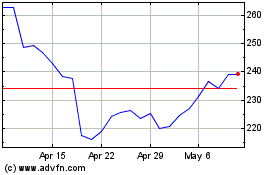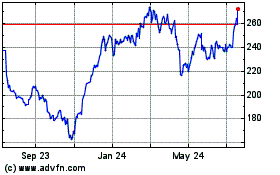By AnnaMaria Andriotis, Daisy Maxey and Telis Demos
Until the Equifax Inc. hack, many consumers didn't know what a
credit freeze was. Now, the credit-reporting company's massive data
breach has people reaching for the tool, a move that could have a
host of implications for both consumers and the financial
industry.
A freeze typically prevents lenders from accessing a potential
borrower's credit report, although it doesn't affect existing
credit arrangements such as outstanding loans or cards. A freeze
makes it unlikely a firm would immediately extend new financing,
which, while helping prevent fraud could also slow legitimate
business.
Freezes are being promoted as a first line of defense in the
Equifax breach, which potentially affected 143 million Americans.
It is a more drastic step than credit monitoring, which alerts
consumers to potentially fraudulent activity on their reports.
Equifax peers TransUnion and Experian PLC said the number of
credit-report freezes being requested by consumers increased
significantly in the days after the Equifax news last week. Tens of
thousands of U.S. consumers initiated credit freezes on Friday and
Saturday alone, said Alex Lintner, president of consumer
information services at Experian.
Previously, credit freezes were typically initiated by people
who either had, say, their identity stolen or earlier instances of
fraud on their accounts. While open to anyone and reversible
temporarily or permanently, most consumers have in the past shied
away from the step because it made getting new credit more
cumbersome. In some states, consumers must pay a fee to temporarily
or permanently lift a freeze.
In a country of free-flowing credit like the U.S., there is
value to relatively open information about a consumer's
creditworthiness. It makes it easier for someone to open a new
credit card at a department store or gain quick approval for a
mortgage.
But the Equifax hack appears to be changing some of that
calculus, as worried consumers say they would rather have their
default information status set to off-limits, unless they choose
otherwise. That adjustment could change consumer behavior, the flow
of consumer credit and, in extreme cases, the long-term rate of
growth for consumer financing.
There is little official government data about freezes. A 2014
paper from researchers at the Federal Reserve Bank of Philadelphia
estimated that about 2 million U.S. consumers placed a credit
freeze or fraud alert on their credit reports in 2012. The paper
also showed that freezes spiked in South Carolina that same year in
response to a data breach at that state's Department of
Revenue.
"This may start to affect some of the spontaneous nature of
credit access," John Thompson, senior vice president at the Center
for Financial Services Innovation, a nonprofit firm that focuses on
consumer financial-health issues.
Jeffrey Mark, of Chicago, froze his credit report with Equifax
this week and is considering doing the same with the other
credit-reporting firms.
"When a credit agency gets hacked, they have very sensitive
information, " said the 65-year-old architect, who plans to freeze
his credit indefinitely. Mr. Mark said he isn't a big acquirer of
credit cards, but expects that seeking credit will become "more of
a hassle" with a freeze in place.
That's a trade-off he said he is willing to make. Given the
amount of information about people taken in the Equifax breach,
"it's very scary if that access becomes available to other people
who shouldn't have it," he said.
Brendan Dickinson, of Darien, Conn., plans to shop for a car in
the near future and said a freeze would make it harder to get
credit. Still, that didn't stop him and his wife from freezing
their credit reports with four companies -- the big three and
another called Innovis -- in recent days.
"I've added a layer of pain for myself, but it seems worth it,"
said the 35-year-old partner at a venture-capital firm, adding that
he expects to keep the freeze on for the foreseeable future.
Some businesses are worried about how the freezes might hurt
business. At Galpin Motors Inc., a Southern California auto
retailer that sells brands such as Ford, Honda and Volvo,
dealerships began training staff Monday on how to handle frozen
credit reports, including who to call at the credit-reporting
companies for help, said Brian Allan, a senior director.
Freezes, he added, create challenges for car buyers, potentially
delaying purchases for days.
Currently, dealers can call up a credit score within minutes.
When a credit report is frozen, it typically requires a customer to
first unlock it with a password and then verify its release to the
store via a phone call, Mr. Allan said.
Often, customers forget their passwords, and it can take up to
72 hours to retrieve it. Or the agency calls a home phone number to
verify the request, even though the customer is at the store, Mr.
Allan said.
"We have people come in, and they don't realize the extent of
what we have to go through," he said.
Credit specialists said rising freezes could ding loan volume,
including for credit cards and auto loans, at the margin.
"Overall, this would lower the actual credit volume and access
to credit markets," said Kurt Herkenhoff, an assistant professor of
macroeconomics at the University of Minnesota and a visiting
scholar at the Federal Reserve Bank of Minneapolis.
Credit growth was already slowing before the Equifax hack. The
rate of year-over-year growth for consumer loans at all U.S.
commercial banks fell to 4.1% in July, less than half the recent
peak of 8.6% in July 2016, according to Federal Reserve data.
Freezes can also stall lending before it gets started. Lenders
often purchase lists of borrowers who meet certain criteria from
credit-reporting companies, including Equifax, to mail them credit
offers. The lists exclude people who have frozen their reports.
"There probably will be some chilling effect on making credit
offers," said Marla Blow, chief executive of FS Card Inc., which
offers credit cards to subprime borrowers. "A spike in freezes is
something we are acutely aware of and working through in
real-time."
--Christina Rogers contributed to this article.
(END) Dow Jones Newswires
September 13, 2017 13:10 ET (17:10 GMT)
Copyright (c) 2017 Dow Jones & Company, Inc.
Equifax (NYSE:EFX)
Historical Stock Chart
From Mar 2024 to Apr 2024

Equifax (NYSE:EFX)
Historical Stock Chart
From Apr 2023 to Apr 2024
